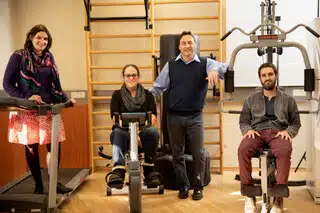Researchers are examining whether aerobic physical activity, which increases the level of oxytocin, the hormone of love and connection in the body, may improve the social functioning of those suffering from schizophrenia

Schizophrenia is a chronic mental disorder that disrupts the perception of reality (damages the ability to understand and interpret). The exact reason for its development is not yet known, but it is thought to be caused by a combination of genetics and environmental factors. The disorder is characterized by symptoms such as hallucinations, false thoughts, disturbances in the organization of speech and thinking, cognitive problems (such as attention and memory), decreased motivation and social skills.
The social problems of those suffering from schizophrenia include isolation, difficulties in communication, lack of initiative, apathy, lack of pleasure, lack of concentration, decreased speech, and impaired cognition and social communication (for example in recognizing facial expressions, tone of voice and gestures). "Those suffering from schizophrenia have cognitive deficits, and especially in social cognition, which harms their social functioning: their integration into society, employment, relationships and relationships, and in fact, everything related to social interaction. This field is one of their main problems", explains Prof. Uri Rasovski, a clinical psychologist and neuroscientist from the Department of Psychology and the Multidisciplinary Center for Brain Research at Bar-Ilan University.
What is the question? How can physical training affect the social skills of those suffering from schizophrenia?
Prof. Rasovsky studies severe psychopathologies and especially schizophrenia in order to understand the brain, biological and psychological processes that cause them and to try to improve the quality of life of the victims. The purpose of his current research, which won a grant from the National Science Foundation, is to try to improve the social functioning of those suffering from schizophrenia through aerobic exercise and psychological therapy focused on social difficulties. Prof. Rasovsky and his team
Studies, including those of Prof. Rasovsky and his team, have shown that aerobic activity, especially intense, contributes to the release of oxytocin - the "hormone of love and connection" - and increases its level in the body. This hormone plays an essential role in regulating physical sensations and bringing the biological systems in the body into balance (homeostasis). Thus, it contributes to reducing stress and anxiety and to alleviating physical and mental pain. In addition, it is known that its level in the body increases during social interaction and positive interpersonal relationships and that it strengthens them and contributes to closeness and social skills.
For the purpose of their current research, Prof. Rasovsky and his team recruited about 100 subjects diagnosed with schizophrenia from various medical centers and hostels in Israel. They were divided into three groups, each of which receives a different intervention: one group performs intense aerobic activity, a second group performs moderate aerobic activity (lower intensity) and a third group performs light physical activity (stretching only). The aerobic activity includes running and using equipment and a ball. Each subject uses a heart rate monitor and the activity is adjusted to the level of basic physical fitness. "The main goal is to raise the heart rate according to the definition of the intensity of the activity," says Prof. Rasovsky. The researchers examine the oxytocin level using saliva samples taken from the subjects at several time points, before and after the physical activity. At the same time, the subjects of all groups receive a social cognition treatment developed at the University of California at Los Angeles (UCLA) and done in collaboration with it. In this treatment, the subjects learn to recognize facial expressions, gestures and different forms of speech.
The training takes place every week and is delivered by certified fitness instructors, and the social cognition treatment is performed by graduate students in psychology from Bar-Ilan University who were trained for this by researchers from UCLA. At this stage, the researchers are collecting the findings and will soon begin their analysis.
In previous studies, we found that martial arts, especially intense ones, increase the level of oxytocin in healthy people and youth at risk. Since those suffering from schizophrenia may have difficulty in this branch, we chose a more general physical activity for them, which would be easy for them to implement.
"In previous studies, we found that martial arts, especially intense ones, increase the level of oxytocin in healthy people and youth at risk. Since those suffering from schizophrenia may have difficulty in this branch, we chose a more general physical activity for them, which would be easy for them to implement. We believe that it increases the level of oxytocin in their bodies and thus contributes to improving their social skills. In general, it is known that physical activity strengthens the mind and contributes to the cognitive and psychological abilities of people in general and those suffering from mental illness in particular", Prof. Rasovsky concludes.
Life itself:
Prof. Uri Rasovsky, 55, married + four children, lives in Shoham. In his free time he trains in martial arts and sailing and is an instructor in these fields.
More of the topic in Hayadan:
- Brainwashing - seahorses and aerobic exercise to improve memory / Yitzhak Farnes
- The sport defeats the cancer through increased production of glucose
- South Korea launched a missile, the satellite inside failed to reach orbit
- Tu Bab: The dark side of the love hormone - similarity between its effects and the effects of alcohol
- A study published on Valentine's Day (Tu Bab): The love hormone causes us not to see shortcomings in our partners
